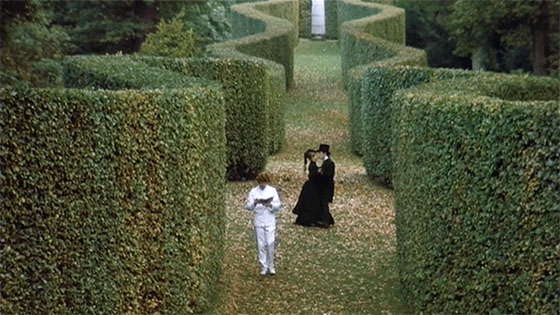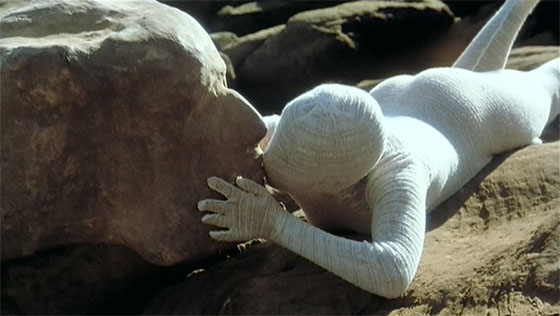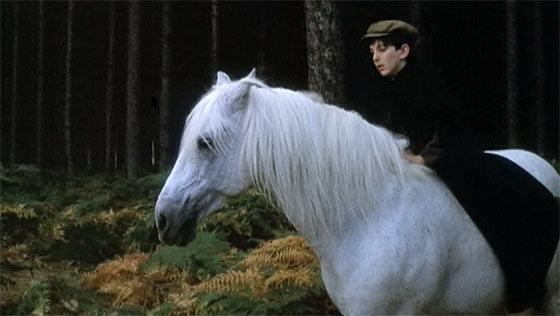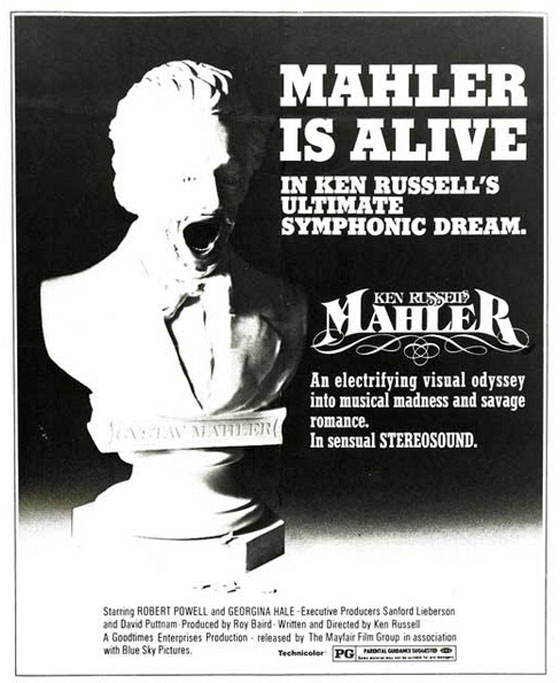
Following the notoriety branded him by the one-two of The Music Lovers (1970) and The Devils (1971), hellion filmmaker Ken Russell pressed on with a string of smaller-scale and more accessible British films, but these nonetheless reinforced the fact that he was a cinematic force to be reckoned with. The Boy Friend (1971), an adaptation of a popular stage show by Sandy Wilson, defused The Devils‘ toxicity with dazzling musical numbers and loads of charm. The self-funded Savage Messiah (1972), a biopic of sculptor Henri Gaudier-Brzeska, captured the volatile energy of a young artist exploring his talent to its limit. And with Mahler (1974), he returned to his project of chronicling the lives of famous composers, begun in his experimental and groundbreaking documentaries for television, including Prokofiev (1961), Elgar (1962), Bartok (1964), The Debussy Film (1965), Song of Summer (1968, on Frederick Delius), and Dance of the Seven Veils (1970, on Richard Strauss), which so angered the Strauss estate that an injunction was issued to prevent the use of the composer’s music in rebroadcasts. Russell would later say in an interview (included on the invaluable 2008 box set Ken Russell at the BBC) that with these biopics he considered himself “a bit of a traveling preacher,” introducing classical music to new fans. Despite the relative respectability of The Boy Friend and Savage Messiah, Mahler isn’t an apology for Dance of the Seven Veils or scandalous Tchaikovsky bio The Music Lovers. It’s another heady dose of Russell’s feverish imagination, full of kaleidoscopic flashbacks and dreams, and dreams within flashbacks, much of it very wild and very funny. It also links itself to Dance of the Seven Veils and the later Lisztomania (1975), giving explorers of the late director’s filmography the impression that Russell may have set a course to create one marathon film about great composers and their relationship to fame, lovers, anti-Semitism, and the birth of Nazism.

The film’s opening dream sequence, with Alma Mahler (Georgina Hale), in chrysalis, kissing a stone in the profile of Gustav Mahler.
The film opens with an image of Mahler’s serene writer’s getaway, a wooden cottage sitting at the end of a lakeside pier, suddenly exploding into flames. We briefly see a screaming, tormented Gustav Mahler (Robert Powell, Secrets), before the opening title obscures his face; then, out of the flames, the soprano temptress Anna von Mildenburg (Dana Gillespie, of Hammer’s The Lost Continent), looking like a vampiress in a Jean Rollin film, and the Mahler daughters, holding a doll and flowers, facing the camera accusingly. Finally we reach the most important woman in his life, his wife Alma (Georgina Hale, The Devils), writhing on a beach, naked except for the chrysalis webbing that encases her. She begins to wriggle loose of her chrysalis before a stone in the shape of Mahler’s profile, which she finally kisses. Then Mahler awakens from his dream. He’s on a train – the last train ride he will ever take. He’s pale, suffering from a cough, one that will soon kill him. The entirety of Mahler takes place on this train journey, which he shares with Alma. Their relationship has grown frosty at best. He has reveries of happier days with his wife, and then nightmares that she is doing the can-can on his coffin. We are deep inside Mahler’s psyche, reliving his life inside-out. We witness his fear and resentment of his driving father and sadistic piano teacher, his education in the world of nature with a Pan-like fellow named Old Nick (Ronald Pickup, The Day of the Jackal), the casual bigotry he endured from anti-Semites, and the success of his career as an opera conductor – his composition work would be recognized only after his death – at the expense of his Jewish heritage: he converted to Catholicism to become the director of the Vienna Court Opera. In the present, he asks his wife to consider leaving him for an old rival, Max (Richard Morant), who has appeared on the train in his latest bid to win Alma. Mahler has grown bitter and withdrawn, and lapses into scornful arrogance, pushing his wife further and further away. But in brief moments his heart seems to thaw, as when children run alongside the train chanting his name and throwing flowers through the window. Each daydream and digression is scored to the works of Mahler, so that every sequence surges with passion.

A young Mahler (Gary Rich) discovers a love of nature while exiled from his hostile home.
There are a handful of Russell’s typical outlandish scenes, from the film’s opening Dalíesque dream, to the portrayal of Mahler’s Catholic conversion as an allegorical silent film, replete with title cards and Buster Keaton-style physical gags, but also blistering Russell images like Cosima Wagner (Antonia Ellis, The Boy Friend) – the wife of Richard Wagner and the daughter of Franz Liszt – dressed in an S&M Nazi uniform while cracking a whip to send Mahler leaping through flaming hoops decorated with crucifixes. She also makes him eat the snout of a pig and rips off his Orthodox Jew uniform in a knife-throwing circus act. (Cosima, perhaps a Russell obsession, would soon become a central figure in Lisztomania, which plays like this short sequence expanded to feature length.) But the most bravura sequence is also Mahler‘s most affecting. The composer wishes only for silence in his cabin on the lake, and complains to his wife that the landscape around him is “as noisy as a nursery.” So Alma sets out to fix the problem by stealing the cowbells off the cows, halting a church bell, purchasing the pipes off a shepherd with a kiss, and quieting a Bavarian music festival by buying a round of drinks in giant steins; soon everyone is dancing only to silence, which Russell hastily replaces with the music now soaring in Mahler’s head. And we see what Mahler sees: soaring over the lake, into the mountains, and finally into outer space, glimpsing the whole of the planet at once. It’s fitting that, despite the bitterness of Mahler in the present, the film ultimately ends on a swooning romantic note – Gustav and Alma rekindling their love for one another at the end of his life, and the end of the train ride. Undoubtedly this is a film about the battle an artist wages between his obligation to his art and to those in his personal life – a recurring theme in Russell’s oeuvre – but the final minutes of Mahler reconcile the two competing forces splendidly. Russell was still out preaching the transformative power of classical music. His mission accomplished, he would turn to rock and roll next, and provide a shot in the arm of his career with the syringe-laced iron maiden of Tommy (1975).










